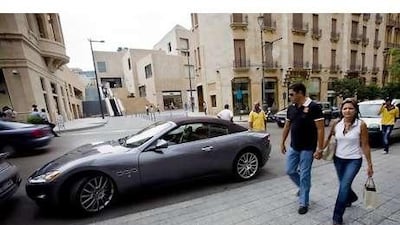Beirut // Despite rampant poverty outside Lebanon's glamorous capital city, the quest for luxury brands, whether genuine or fake, is a way of life here, and Porsche Panameras and Rolls-Royce Phantoms regularly cruise the cobblestone streets of the city's Central District.
Hardly surprising then that luxury tourism is fast becoming a cornerstone of the country's economy. "Lebanon has developed tremendously in terms of the luxury segment in the 2009-2010 period, with the likes of Christian Dior, Hermes and Louis Vuitton setting up shop in Beirut, and Chanel soon to follow," said Izzat Traboulsi, the general manager of Hugo Boss in the Middle East. The brand is also no stranger to the trend: its premium Boss Black and Boss Selection stores in Beirut are scheduled to open early next year.
Around town, cranes are popping up, towering over gigantic, under-construction five-star hotels such as the Kempinski and the Hyatt. Other international hospitality names such as the Hilton, Le Royal and the Landmark have elected Beirut as their next destination, while resident boutique hotels such as Le Vendome and the Albergo are expanding. "About 7,000 of the 9,000 rooms that will be available in Beirut by 2013 belong to the luxury four and five-star segment," says Naji Morcos, a partner at Hodema, a hospitality consulting company. In fact, about US$1 billion (Dh3.67bn) has been invested in the luxury hotel industry during the past five years, a significant figure in a country where the GDP was $34bn last year.
Large consortiums made up of heavyweights such as Prince Alwaleed bin Talal bin Abdulaziz Al Saud and the al Khorafi family, which financed the Four Seasons, are pumping money into these high-end projects. "Others are funded by traditional Lebanese hotelier families such as the Saabs, Abchis or Salhas," Mr Morcos said. The fact that Lebanon has made a major push to break into the regional fashion scene has contributed to the sector's growth.
"Lebanon's luxury fashion sector is today on par with the rest of the Gulf area and only second to Dubai, which remains one of the top four luxury destinations in the world," Mr Traboulsi said. Hugo Boss's growth figures in the country have exceeded regional levels, illustrating the rise in high-end fashion brands. "They reached 27 per cent in 2008, compared to 22 per cent for the rest of the region, and sales increases witnessed in Lebanon in 2009 were the highest in the region," Mr Traboulsi said.
Solidere, the property company in charge of rebuilding the heart of Beirut Central District, is bringing more big names to the city. Besides attracting fashion brands such as Hermes and Jimmy Choo, it is focusing on gourmet restaurants. "Solidere has earmarked $30 million for these projects," Mr Morcos said. "After Dubai and London, MoMo is opening in the downtown area, along with Joel Robuchon and Yannick Alleno."
Contrary to popular belief, the luxury tourism sector is being fuelled by Lebanese consumers. "This year's growth rate fell below estimates of 6 per cent, which can be attributed to the fact that many more players have entered the market," Mr Traboulsi said. "In addition, tourism figures lagged behind initial projections." Even so, Lebanon's prospects will remain high as long as the country maintains a semblance of stability.
Besides luxury stores and restaurants, its revamped downtown area boasts a Phoenician-Persian quarter, a medieval moat, an ancient school dating back to the Mamluk era and scores of ancient mosques and churches. With such a mix of offerings, luxury tourists have the unique opportunity of pursuing hedonistic pleasures that are also accented with culture and history. @Email:business@thenational.ae

